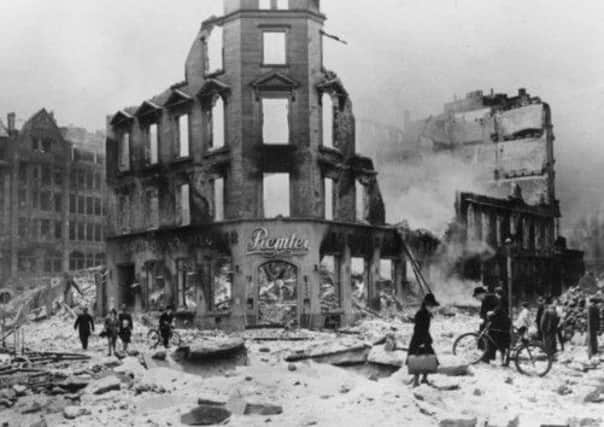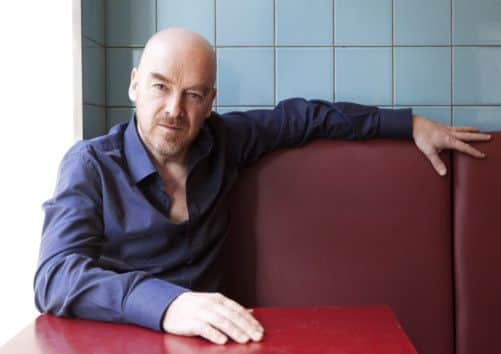Book review: The Aftermath


For the families of those sent to administer Hamburg in 1946, that strange people lived in an even stranger city – one in which, in July 1943, more bombs had fallen in just one week than fell on London in the entire war. On one night, so many incendiaries fell that a firestorm flattened eight square miles of Hamburg, its roaring 1,000-foot tower of flame sucking the air out of bomb shelters and sweeping up anyone still on the streets in its 150mph winds.
From such horrors – and those of the concentration camps nearby – how could there ever be a way back?
Advertisement
Hide AdThat is the background to Rhidian Brook’s novel The Aftermath – soon to be turned into a feature film by Ridley Scott’s production company – but it is only part of the story. The heart of it is based on an intriguing chapter in his own family history.


As a child growing up in Wales, he had always been proud of his grandfather Walter. And with good reason: this was a man who, at the end of the First World War had fought alongside Lawrence of Arabia. At the end of the Second, he was a colonel entrusted with the administration of a huge tract of countryside north-west of Hamburg.
All that was part of family lore, because in 1946 Col Brook had sent for his wife and three children to come and live with him. All other high-placed British officials in occupied Germany had requisitioned large houses for their families, but Col Brook was different. When he was shown the mansion selected for him, he allowed its German occupants to stay on there. They would share it, he decided; victors and vanquished living in harmony together, the very model, he hoped, of the new country rising from the ashes of the old.
Rhidian heard more of the story from his father Anthony, who was eight when he arrived in Hamburg’s Dammtor station and was driven through the shattered city “When my father told me, I thought what a great set-up for a novel it would be – a British family sharing a house with Germans just one year after the end of the war. I haven’t yet found anyone else who did the same thing. If anything, the decision to share a house was slightly frowned upon.
“But what hooked me was realising that, because of the war, my grandmother Anthea hadn’t seen my grandfather for a long time. And there was a certain resentment about having to go to Germany and to share a house with former enemies. I realised that this wasn’t just the story of a reconstruction of a country, but it was probably also about a reconstruction of a marriage.”
Three years ago, he was in the office of Ridley Scott’s film production company. He had planned to pitch three different ideas. Instead, he found himself talking about what a great film could come out of out that interplay between rebuilding a marriage and rebuilding a country. “That’s it!” the producer told him. “I don’t want to hear any more ideas. I want that one!” (A smart move, as it turned out: not only had Ridley Scott’s own father been involved in postwar reconstruction in Germany, but later the head of Universal read the novel on a plane to LA, loved it, and came on board as well.)
Advertisement
Hide AdWith a script commission in the bag, he broke the news to his agent. It would make a great novel too, she said: he’d better write it – or at least the first 80 pages. When he did, she put it up for a publishers’ auction. Rights were quickly sold in 20 countries. Now all he had to do was to finish the script and the book and make sure they both lived up to all these great expectations.
He’d have to change quite a lot of the story. The names, obviously: the kind-hearted Colonel Brook would become the kind-hearted Colonel Lewis. But emotional dynamics within the house would be altered too. The mother of the German family might be missing or perhaps dead; the colonel’s wife would be mourning the death of her eldest son in a bombing raid and antagonistic to Germans as a result. The daughter of the German family would resent the new occupiers and be lured by the German resistance. There would be other sexual tensions that ensured the novel would be a portrait of a marriage as well as a piece of historical fiction.
Advertisement
Hide AdThe main facts of the period would, however, be unaltered, because this period of history was already fascinating and curiously underexplored. “In years to come,” Colonel Lewis muses, “his son and his children would know the names of planes and tanks and battles and invasions and recall with facility the atrocities of the age, the names of those who committed them. But would any of them be able to name a single repairer of the breech or fixer of broken walls?” And so it has come to pass: the peacemakers may indeed be blessed, but only the most important of them ever make it into popular consciousness.
Yet without them, how do you get an occupied country up and running? It’s something we have failed to do ten years after the occupation of Iraq, 12 years after the invasion of Afghanistan. And certainly when the British arrived in Germany, they had no idea how long the task would take. Ten years, reckoned the optimists. Most people thought it would take five times as long.
“In many ways,” says Brook, “the Brits were amazing. They got the free press up and running, and the giant VW plant too. They realised the importance of de-Nazification and started trying to un-brainwash a nation. What really surprised me was the ground-level attempt to be civilised, setting up book groups, showing films … there was a genuine attempt to treat former enemies as human beings. All these little clubs, societies and churches reaching out, the Salvation Army giving out clothes, all these little acts of kindness.”
With its implicit themes of forgiveness and kindness, it is easy to see why his grandfather’s story would appeal to a committed Christian like Brook. From his award-winning debut novel, The Testimony of Taliesin Jones to his screenplay for Africa United to his 150-plus mini-homilies for Radio 4’s Thought for the Day, his faith is central to both his writing and his life – indeed, the week after our interview, I woke up one morning to hear him deliver a self-questioning piece about taking in a down-and-out off the freezing streets to spend the night in the comfort of his Twickenham home.
“Yet in some ways,” he admits, “this is the least overtly spiritual thing I have ever written. Jesus said, ‘Be as cunning as serpents and as wise as doves’ yet in the world of literature remaining true to what you believe is harder than you might think when it comes to making your living as a writer.
“What drew me to the story was the notion that sometimes kindness can be risky. I had to amplify the dangers that my family faced in real life. And forgiveness too could be more complicated than one might think, because the de-Nazification process was a very flawed and imprecise form of sorting out people who were guilty. The challenge for the story is making some of those characters sympathetic enough, so that you are dealing with rounded human beings, not ciphers.”
Advertisement
Hide AdBrook has done that admirably: certainly, at no stage does the reader feel preached at. He has also rearranged reality to produce a nicely wrought drama too: whereas in real life his grandfather’s house-sharing was amicable and not emotionally fraught, here it sets off tensions that echo throughout the novel.
Any good historical novel has to unwind the layers of history that have piled upon the events described and render them as open to possibility and uncertainty as our own present. The Aftermath does that impressively well – helped, admittedly, by the widespread ignorance about those years between the end of the Second World War and the start of the Cold War.
Advertisement
Hide AdThat freak winter of 1946-7, for example, was so cold that the Elbe froze over for 120 days. To get coal, Brook’s uncle told him, German children would be held upside down over railway bridges and try to dislodge coal from the tenders of trains passing underneath by lashing out with golf clubs. At such a time, the British were going around closing German factories and carting off their contents to Russia in order to pay for food. There were riots – and who’s to say the rioters didn’t have a point? There were hundreds of thousands of children who had been brainwashed by years of Nazi ideology – and who’s to say that they wouldn’t want to join the resistance against the occupying armies? There were women who, tired of war, hunger and of using beetroot juice for lipstick, might forget their wedding vows and have sex for money: who amongst us would cast the first stone?
All around the mansion near Hamburg that Rhidian Brook’s grandfather moved into in 1946, these vast historical forces were swirling. But it’s the human story at the centre that Brook wanted to get right.
“It’s like Tolstoy said at the end of War and Peace where he dismissed the notion that history is about great men and says that what really makes a difference is a whole of connected, unheralded actions. That’s what I was exploring here, and even though I had toyed with the idea of writing it as a non-fiction memoir, the thing about being a novelist is that you can get right into the minutiae. Of course, I was hugely nervous about giving the book to my father. But not only did he like it, he said that I had instinctively got things right that I couldn’t possibly have known, like the thought processes of some of the characters.”
Filming will, he tells me, start early next year and it will be released 2015. He doesn’t yet know who’ll be starring in it “but there’s a lot of money behind it, so you’ll know the people in it”. For director, he’d love to see Peter Weir (Witness, Master and Commander, etc) – “at least, he’s got the book”.
What’s next? “Well, there’s an idea that both the BBC and Channel 4 have turned down, but I hope it comes back. “I was thinking about a British equivalent to The Sopranos, and Ray Winstone as a porn baron who wants out.”
I don’t know about you, but personally, I’m like the Scott Free producer who signed up The Aftermath. “That’s it!” I want to tell him. “I don’t want to hear any more ideas! I want that one!”
But this one first, obviously.
• The Aftermath, by Rhidian Brook, is published by Viking, price £14.99. Rhidian Brook will be at the Edinburgh International Book Festival in August.